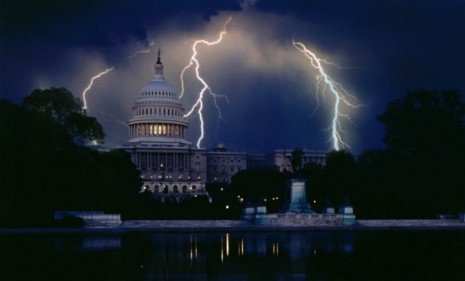What caused the national debt? 6 culprits
It took a lot of spending to hit the $14.3 trillion debt ceiling. Where did all the money go?

A free daily email with the biggest news stories of the day – and the best features from TheWeek.com
You are now subscribed
Your newsletter sign-up was successful
President Obama and congressional Republicans are reportedly "very close" to reaching a deal to slash trillions from future deficits in exchange for raising the nation's $14.3 trillion legal borrowing limit. Without a deal by Aug. 2, the government will run out of money to meet its financial obligations. But with all the fierce wrangling in Washington over the national debt, many Americans may be wondering how we ran up a $14.3 trillion tab in the first place. In 2001, the national debt stood at just $5.8 trillion. Why did the government have to borrow so much more in such a short time? Here, six factors that hit the nation's bottom line:
1. The Bush tax cuts
The biggest culprit? The 2001 and 2003 tax cuts under then-president George W. Bush, says the Associated Press. They have added an estimated $1.6 trillion to the national debt. It's pretty clear, says Brian Beutler at Talking Points Memo, that Bush-era policies, "particularly debt-financed tax cuts," make up "the lion's share of the problem." And they're ongoing, so the tab for them builds every year.
The Week
Escape your echo chamber. Get the facts behind the news, plus analysis from multiple perspectives.

Sign up for The Week's Free Newsletters
From our morning news briefing to a weekly Good News Newsletter, get the best of The Week delivered directly to your inbox.
From our morning news briefing to a weekly Good News Newsletter, get the best of The Week delivered directly to your inbox.
2. Health care entitlements
Democrats "constantly harp" about the Bush tax cuts, says Peter Morici at Seeking Alpha, but those rates were in place in 2007, and the deficit that year was one-tenth this year's budget shortfall of $1.6 trillion. So what has changed since then? Added "federal regulation, bureaucracy, and new Medicaid and other entitlements have pushed up federal spending by $1.1 trillion — $900 billion more than required by inflation." And down the road, says Yuval Levin at National Review, our "health-entitlement explosion" will account for "basically 100 percent" of our debt problem.
3. Medicare prescription drug benefit
Another piece of the pie: George W. Bush's addition of Medicare's prescription drug benefit. That has added $300 billion to the debt, according to the AP. Expanding entitlements like Medicare, or last year's health-care reform package, is a particularly tempting way for Congress to run up debt, says Jagadeesh Gokhale at The Daily Caller. Since lawmakers don't typically map out a revenue strategy to fund those benefits, they are "shielded from the political costs of actually paying for the new programs."
A free daily email with the biggest news stories of the day – and the best features from TheWeek.com
4. The wars in Iraq and Afghanistan
The tab for the wars in Iraq and Afghanistan comes to $1.3 trillion, another major chunk of new, unexpected spending over the last decade. "These wars cost us plenty," says Nake M. Kamrany at The Huffington Post, and they "have to be financed with borrowing, which adds up to national debt."
5. Obama's economic stimulus
The 2009 stimulus package enacted by President Obama cost $800 billion. And the 2010 tax-cut compromise between Obama and Republicans, which extended jobless benefits and reduced payroll taxes, added another $400 billion to the debt. Add another $200 billion for the 2008 bailout of the financial industry, and the government's efforts to soften the blow of the Great Recession amount to one of the largest chunks of the debt build-up. The "federal budget was one good year away from balancing" after 2007, says Tom Blumer at News Busters. But in the years since, Obama and Democrats in Congress put that goal out of reach.
6. The Great Recession
Some of the spending gap came from factors outside the control of Congress and the White House. As the government spent heavily to boost the economy, says the AP, it took in hundreds of billions less in tax revenue than expected, because the Great Recession eroded Americans' income and spending.